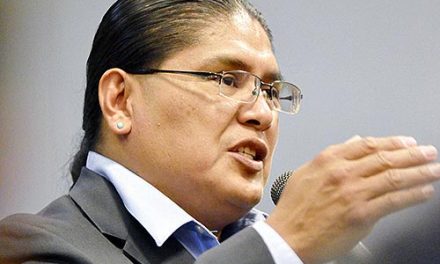
Leading the charge for HIV/AIDS across Arizona

Courtesy | RSVP Photography
Participants held banners of pride and partners during the “Paint the Town Red” AIDS Walk and 5K Run on April 6 in Tempe, Ariz. Aunt Rita’s Foundation, which has led efforts in ending HIV/AIDS in Arizona since 1988, hosted the event.
WINDOW ROCK – One of many organizations initiating an end to HIV/AIDS in Arizona is the Phoenix-based nonprofit Aunt Rita’s Foundation, with avid members paving the way.
Aunt Rita’s Foundation began efforts in fundraising to alleviate the rise in AIDS/HIV in 1988.
To date, Aunt Rita’s Foundation has issued over $2.5 million in grant funding through an AIDS Walk and 5K Run event called “Paint the Town Red.”
This year, $225,000 was raised on April 6 in Tempe, Arizona.
According to Stacey Jay Cavaliere, the executive director of Aunt Rita’s Foundation, the event directly supports essential HIV/AIDS services across Arizona provided by Aunt Rita’s community partner agencies. Aunt Rita’s Foundation provided millions of dollars to HIV programs and sees itself as the “Connector of the HIV Community,” which fills slots with programs that include testing and collaborative initiatives.
Driven impact
Stacey Jay Cavaliere said this year he is proud of the work and the organization’s partners because of the microscopic focus on HIV/AIDS testing and outreach education initiatives.
Cavaliere added that the infection rate is increasing in certain areas throughout Arizona and that people need access to education and testing.
According to the Arizona Department of Health Services 2023 annual report, in 2022, 19,894 people were living with HIV/AIDS in Arizona.
About 647 incident cases resided in Maricopa County, and 141 lived in Pima County. Pinal County had the highest HIV/AIDS incidence rate, and 70 percent of those cases were incarcerated.
Additionally, 326 deaths occurred among known PLWH people living with HIV in Arizona, the report states.
Cavaliere said the organization uses ADHS, Centers for Disease Control and Prevention, and National Institutes of Health data and reports to pinpoint HIV-affected areas throughout Arizona.
But also collects in-house data throughout Aunt Rita’s Foundation.
Cavaliere said often, people forget those with lived experience are forecasted, and it’s a disservice to the community because then it is unknown what the community needs regarding HIV.
“That’s why it’s so important to Aunt Rita’s Foundation to really strategically partner with organizations and community groups that directly serve the population that we need to address,” Cavaliere added.
Beacons of light
What makes the work unique and essential to Stacey Jay Cavaliere is how he has come full circle with leading the mission of Aunt Rita’s Foundation.
As a proud HIV-positive man, Cavaliere recalls the moment he was diagnosed with HIV when he was a young adult.
He described it as “emotional” and “overwhelming” and said although he knew there were resources to aid support, he was disconcerted by the news.
“One thing I did know (was) to take action when I was ready,” Cavaliere said. He added the organization was the first place he called.
“They (Aunt Rita’s Foundation) connected me to case management, to a doctor––all of those things in order for me to really get on track,” Cavaliere said.
He said that the organization had an extraordinary impact on him. He hopes to share with others with HIV or who have been affected by HIV.
“We have to constantly educate ourselves, communicate with each other what’s going on,” Cavaliere said. “Most importantly, really speaking to the experts with the people with the lived experience with HIV.”
Passion creates change
Passionate community organizer, activist, and advocate Trudie Jackson, a transwoman, serves as the co-chair with Aunt Rita’s Foundation, which to her recollection, there has never been a Native co-chair.
Jackson, from Teec Nos Pos, Arizona, said she started in the public health sector in 2005 as an outreach worker focusing on high-risk populations and the importance of HIV testing. She has led efforts for trans women of color and Indigenous peoples.
Although she has been living in Phoenix for the past 40 years, she said there had always been an awareness of those who have succumbed to HIV or have passed from HIV.
“There’s that stigma still associated,” Jackson said. “It’s like tribes need to understand these are individuals from their community that are affected by HIV or AIDS, therefore start those conversations.”
Jackson recalled her first preliminary positive, which gives a reactive result when HIV infection has not occurred and is known as a “false positive.”
According to the Centers for Disease Control and Prevention, a false positive result initiates reactive rapid test results called “preliminary positives.” One or more supplemental laboratory tests must confirm it.
“I remember it was hard for me to disclose their (friend) status, but I was very thankful to have a supervisor and colleagues there to support me,” Jackson said.
“Tribes need to come to terms (with the fact) that HIV does not discriminate because it impacts all communities,” said Jackson, who is Tódích’íi’nii and born for Bit’ahnii. Her maternal grandfather is Naakaii Dine’é, and her paternal grandfather is Hashk’ąą Hadzohó.
Navigating conversations and highlighting the critical need for accessible healthcare and education for those affected by HIV/AIDS are uncomfortable conversations but are needed to prevent stigmas from prevailing.
Curiosity leads to leading
A curious and dedicated leader of Aunt Rita’s Foundation, Eddie George, who self-identifies as a two-spirit person, found purpose in 2010 as a Grand Canyon Sisters of Perpetual Indulgence, a worldwide organization of drag queens who visit communities to promote human rights and the beauty of all people.
Then Sister Navi Ho was born, and his pronouns are he/she/they.
Navi Ho sparked conversations with communities and organizations like Arizona’s Tribal Nations and served as the first-year director of the Navajo Nation Pride Board in 2023.
The avant-garde Navi Ho asked, “How does HIV and AIDS affect Indigenous communities? How does it affect the Navajo community?”
Growing up, he never knew anyone who was HIV/AIDS positive and became curious to understand the impact of HIV/AIDS it had on Indigenous and Diné communities.
“It’s (HIV/AIDS) here and teaching, not only our youth but our elders, that getting tested, knowing your status, and if you are infected, there are treatments,” Navi Ho said.
Avant-garde Navi Ho is committed to promoting all people’s human rights and beauty.
“I talked to many tribe groups and told them you guys need to be out there and letting them know this is important. The more we speak, the more we talk, the more we communicate, I feel would be better for our Indigenous people,” he added.
Navi-Ho mentioned he had friends in Gallup who are in limbo of testing for HIV/AIDS because of the forecasted conversations regarding it. “It affects all of us,” he said, who is Tł’ízíłání and born for Mą’ii Deeshgiizhnii. His maternal grandfather is Ta’neeszahnii, and his paternal grandfather is Bit’ahnii. His parents are from Tuba City and White Cone, Arizona.
Navi-Ho encourages many to get tested, regardless of their lifestyle.
Altogether, Aunt Rita’s Foundation is committed to creating a personal narrative and guiding more inclusive and supportive communities to fight against HIV/AIDS.
“It’s knowledge, it’s educating, it’s sharing, that’s the protection,” Navi-Ho said, regarding the importance of getting tested.










 Highway 264,
Highway 264, I-40, WB @ Winslow
I-40, WB @ Winslow